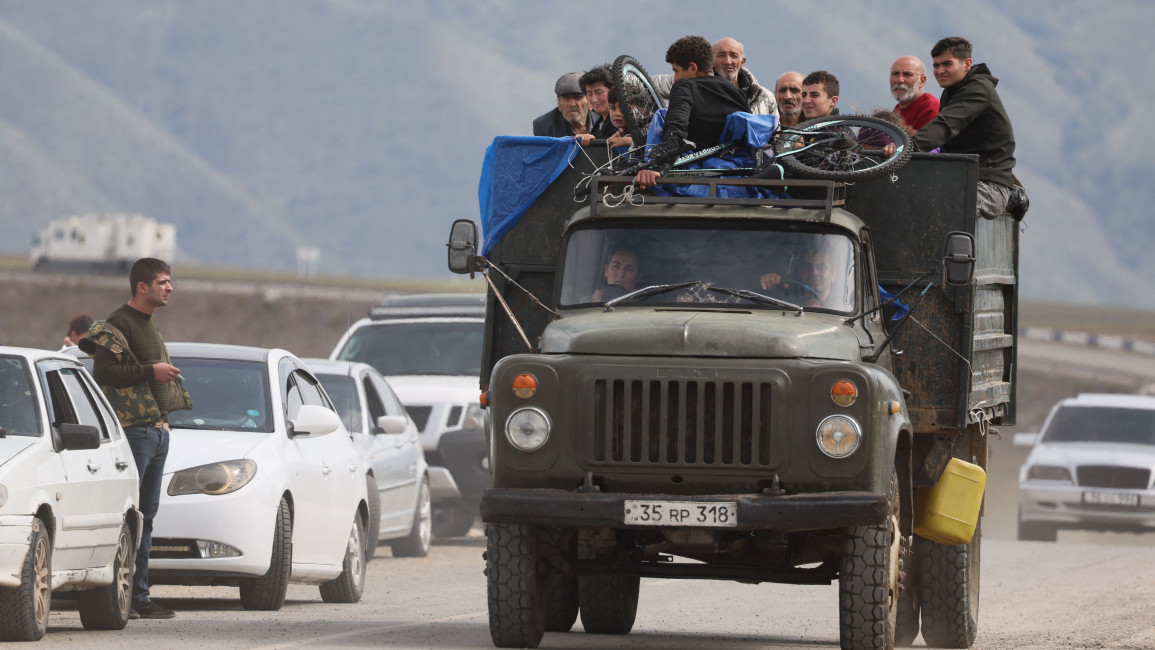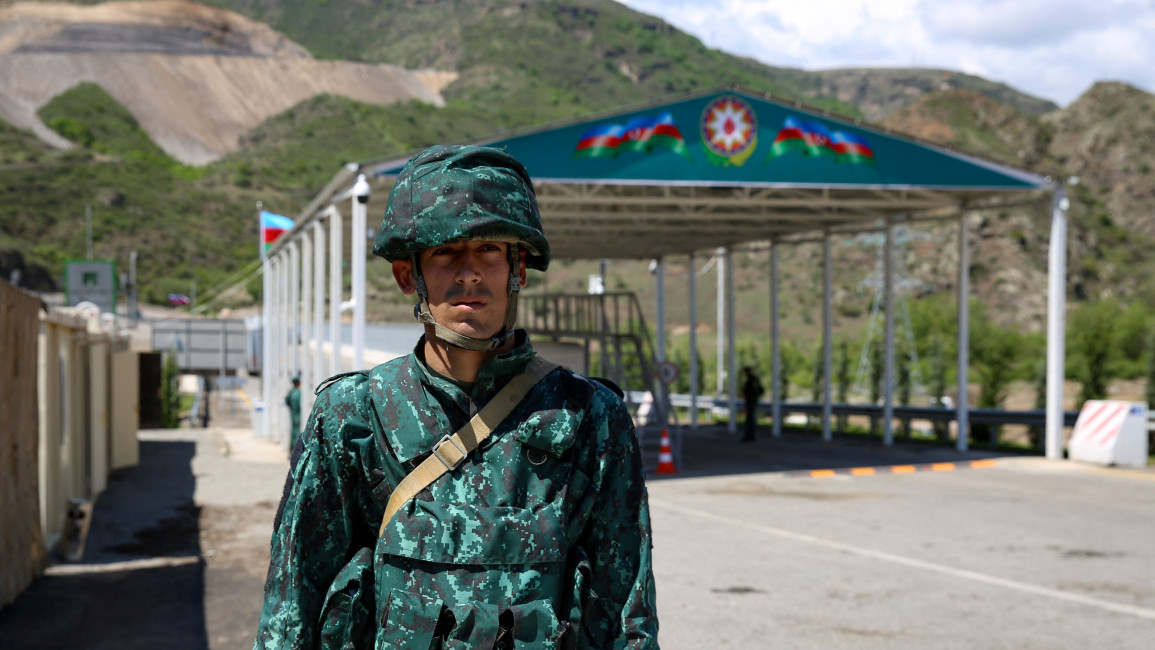
The geopolitical implications of Nagorno-Karabakh's demise

On 19 September, Azerbaijan launched a large-scale military offensive in Nagorno-Karabakh.
Azerbaijan’s offensive aimed to vanquish the Republic of Artsakh, an ethnically Armenian majority autonomous enclave governed from Stepanakert, and assert its control over the entirety of Nagorno-Karabakh.
Azerbaijan’s brief military campaign, which followed a months-long blockade of the Lachin Corridor that supplies Artsakh, was a resounding success.
As Armenian Prime Minister Nikol Pashinyan and Armenia’s treaty ally Russia refused to intervene on Artsakh’s behalf, Artsakh President Samvel Shahramanyan sued for peace on Azerbaijan’s terms on 20 September.
"Even though Azerbaijan achieved a final victory in Nagorno-Karabakh with surprisingly little effort, its triumph will have profound geopolitical implications for the South Caucasus for years to come"
The Artsakh Defence Army was disbanded, and fears of potential ethnic cleansing and genocide caused tens of thousands of ethnic Armenians to flee Artsakh.
On Thursday, the separatist government said it will dissolve itself and the unrecognised republic will cease to exist by year’s end.
Azerbaijan’s swift triumph over Artsakh is a major victory for Turkey’s ambitions in the South Caucasus but poses strategic challenges for Russia and Iran, and moral dilemmas for Western powers.
While mass protests against Pashinyan are unlikely to dislodge him from power, he faces an uphill struggle to manage the inflow of ethnic Armenian refugees fleeing Nagorno-Karabakh.
Turkey's strategic triumph in Nagorno-Karabakh
Since Turkey aided Azerbaijan’s reconquest of large swathes of Nagorno-Karabakh during the fall 2020 war, it has framed itself as a peacekeeper in the South Caucasus.
President Recep Tayyip Erdogan has taken tentative steps towards normalisation with Armenia, such as his October 2022 summit with Pashinyan and support for cross-border transit, while tying a full reconciliation to an Armenia-Azerbaijan peace treaty.
Despite expressing interest in de-escalating tensions in the South Caucasus, Turkey has routinely reiterated Azerbaijan’s allegations of Armenian obstructionism. When border clashes erupted in September 2022, Turkey blasted Armenia’s “aggressive attitude” and accused it of undermining the 2020 ceasefire agreement.
During Azerbaijan’s most recent offensive, Turkey expressed similar views. On 19 September, Erdogan told the United Nations General Assembly “We support the steps taken by Azerbaijan - with whom we act together with the motto of one nation, two states - to defend its territorial integrity”.
|
|
Beyond upholding Turkey’s long-standing alliance with Azerbaijan, Erdogan sees geo-strategic opportunities emanating from the integration of Nagorno-Karabakh with Azerbaijan.
Turkey is especially supportive of Azerbaijan’s plans to construct the Zangezur Corridor, which Erdogan believes will enhance the cultural and economic unity of the “Turkish World.” This transit route would give Azerbaijan unfettered access to the Nakhchivan Autonomous Republic, an Azerbaijani exclave that lies to the west of southern Armenia’s Syunik province, and link Azerbaijan to eastern Turkey.
To underscore the Zangezur Corridor’s significance, Erdogan met with Azerbaijani President Ilham Aliyev in Nakhchivan on 25 September. During their meeting, Erdogan and Aliyev also formally inaugurated the 85km Nakchivan natural gas pipeline, which links eastern Turkey’s Igdir province to Sederek in western Azerbaijan.
This project could accelerate Turkey and Azerbaijan’s progress towards expanding bilateral trade from $6 billion to their near-term trade target of $15 billion.
"As Russia-Armenia relations deteriorated, the Kremlin assiduously courted closer relations with Azerbaijan"
Challenges for Russia and Iran after Azerbaijan's victory
Although Russia maintained a contingent of 2,000 peacekeepers in Nagorno-Karabakh and saw five of its peacekeepers perish in an accidental shooting by Azerbaijan, it refrained from military intervention.
Instead, Russian peacekeepers brokered the ceasefire that surrendered Nagorno-Karabakh to Azerbaijan and distributed 50 tons of humanitarian aid to Stepanakert.
Russia’s restraint can be explained by its frustrations with Pashinyan’s leadership and desire to upgrade its partnership with Azerbaijan. Russia’s refusal to answer Armenia’s calls for Collective Security Treaty Organization (CSTO) assistance during the 2020 Nagorno-Karabakh War and Pashninyan’s reciprocal refusal to support Russia’s invasion of Ukraine soured bilateral relations.
Pashinyan’s courtship of closer ties with the West, which was evidenced by the US-Armenia military exercises that coincided with Azerbaijan’s offensive, further inflamed tensions with Russia.
Deputy Chairman of Russia’s Security Council Dmitry Medvedev slammed Pashinyan for deciding to “flirt with NATO”. The popular pro-war Rybar Telegram channel falsely claimed that 110,000 Armenians protested against Pashinyan and urged members of the Armenian diaspora inside Russia to facilitate a regime change.
As Russia-Armenia relations deteriorated, the Kremlin assiduously courted closer relations with Azerbaijan. On 20 September, State Duma Foreign Affairs Committee chairman Leonid Slutsky hailed Azerbaijan as a “strategic partner’ and warned against Western attempts to sabotage closer ties between Moscow and Baku.
Slutsky’s strong reaction reflects Azerbaijan’s rising economic importance for Russia. From January to April 2023, trade between Russia and Azerbaijan increased by 55.3% compared to the previous year.
In November 2022, Russia’s Gazprom agreed to ship up to 1 billion cubic meters of gas to Azerbaijan’s SOCAR, which fuelled rumours that Azerbaijan was repackaging Russian natural gas for European consumption.
Over the past five years, tensions between Azerbaijan and Iran have remained high. Iran’s alleged pro-Armenian stance on the Nagorno-Karabakh conflict, Azerbaijan’s security partnership with Israel, and violent incidents, such as the January 2023 attack on Azerbaijan’s embassy in Tehran, fuelled these frictions. Iran also opposed the Zangezur Corridor project, as it would block its land border trade with Armenia.
|
|
Despite these tensions, Iran has struck a middle-ground position on Azerbaijan’s impending reintegration of Nagorno-Karabakh.
On 26 September, Iran’s newly appointed ambassador to Armenia Mehdi Sobhani met with Pashinyan and expressed concern about the humanitarian crisis afflicting ethnic Armenians in Nagorno-Karabakh.
Concurrently with this meeting, Erdogan claimed that Iran had softened its opposition to the Zangezur Corridor. Erdogan justified this bold assertion by saying that the corridor would pass through Iran if Armenia denied Azerbaijan access to its Syunik province on sovereignty grounds.
A moral dilemma for Western powers
Amidst mounting criticisms from the Armenian National Committee of America (ANCA) lobby and pro-Armenian voices in Congress like newly indicted New Jersey Senator Bob Menendez, a US delegation led by USAID chief Samantha Power visited Armenia on 25 September.
Power called upon Azerbaijan to facilitate the evacuation of injured civilians from Nagorno-Karabakh and warned that many ethnic Armenians suffered “severe malnutrition” stemming from the Lachin Corridor blockade. Power subsequently embarked on a trip to Azerbaijan to pressure its political leadership on Nagorno-Karabakh.
Despite these strong words, Western countries have limited scope for action in Nagorno-Karabakh.
The European Parliament’s Foreign Affairs Committee chair David MacAllister claimed on 25 September that the coerced expulsion of ethnic Armenians from Nagorno-Karabakh would have “serious consequences” for EU-Azerbaijan relations.
"Despite strong words, Western countries have limited scope for action in Nagorno-Karabakh"
Due to Europe’s energy demand, this is unlikely to extend to sanctions on Baku. In 2022, Azerbaijan increased its gas exports to Europe by 18% and registered larger increases in Mediterranean countries, such as Italy which upped purchases by 41.2%.
Azerbaijan’s critical role in the Greece-Bulgaria Interconnector Pipeline, which Baku and Brussels view as essential for weaning Europe off Russian gas, further muddies the path towards punitive action.
The contradictions between rhetoric and policy have been acknowledged in off-record musings by Western officials.
In a series of exchanges with The Guardian on 25 September, one European diplomat claimed that NATO is paralysed because of Turkey’s support for Azerbaijan’s position on Nagorno-Karabakh, while a second diplomat answered “not really” when asked if the EU or NATO have leverage in the crisis.
The humanitarian and political impacts of the crisis on Armenia
As the international community either enables Azerbaijan or refrains from decisive action, the humanitarian crisis for ethnic Armenians in Nagorno-Karabakh continues to worsen.
By 28 September, the Armenian authorities claimed that they had received more than 65,000 refugees from Nagorno-Karabakh, which amounts to over one-third of the region’s population.
Despite Azerbaijan’s claims that the rights of ethnic Armenians are guaranteed in Nagorno-Karabakh and offers of amnesty for Artsakh Defence Forces fighters who laid down their arms, the fear of genocide inspired mass emigration from the region.
Armenian Foreign Minister Ararat Mirzoyan’s claims that Azerbaijan’s goal in Nagorno-Karabakh is ethnic cleansing only added to those fears.
|
|
Although Pashinyan initially tried to discourage the mass emigration of Karabakh Armenians to Armenia, he is now focused on obtaining humanitarian assistance from Western countries.
Pashinyan’s discussions with French President Emmanuel Macron on 27 September reflect this agenda. Even though the Armenian economy grew by 11.3% in 2022, as Russian businesses and anti-mobilisation protests emigrated to Armenia, it will likely need foreign assistance to accommodate the influx of refugees from Nagorno-Karabakh.
Even though Azerbaijan achieved a final victory in Nagorno-Karabakh with surprisingly little effort, its triumph will have profound geopolitical implications for the South Caucasus for years to come.
Pashinyan’s legacy will be forever tarnished in Armenia by the surrender of Nagorno-Karabakh and his handling of the resettlement of ethnic Armenians could determine his political future.
Samuel Ramani is a tutor of politics and international relations at the University of Oxford, where he received a doctorate in 2021. His research focuses on Russian foreign policy towards the Middle East
Follow him on Twitter: @SamRamani2





